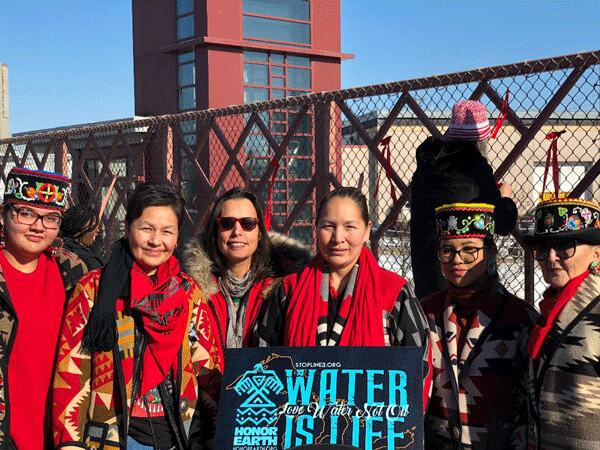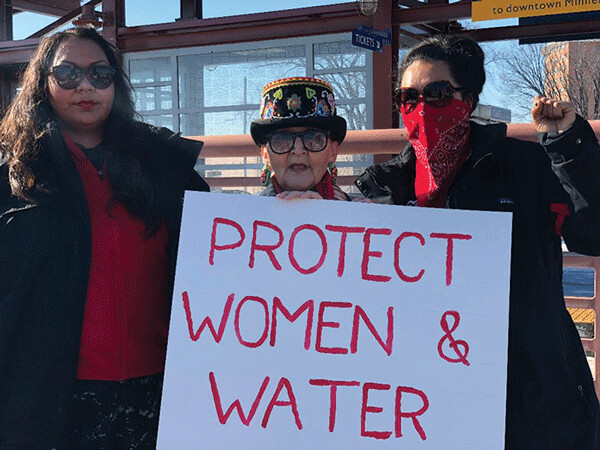What Enbridge Money Can and Cannot Buy


This past month in Enbridge’s relentless pursuit of a seventh tar sands pipeline, we can see the political pressure that $5 million worth of lobbying can buy in Minnesota, and what it cannot buy. This past month, the Red Lake Nation voted to boot Enbridge from its land, a move coming two months after the tribe rescinded an $l8.5 million deal that would have allowed the company’s pipelines to stay in place. Four of the six Enbridge crude oil pipelines that cross northern Minnesota were inadvertently built decades ago on a small piece of land near Leonard that belongs to the Red Lake Band of Chippewa.
In the meantime, Enbridge outspent any lobby for the past decade in Minnesota, slathering $5 million towards the Public Utilities Commission (PUC), hoping for a June approval of Line 3, the largest tar sands pipeline into the US, if approved. In mid- March, Minnesota’s Public Utility Commission, rejected a joint appeal by White Earth and other tribal nations to consider a survey of tribal cultural properties in the final decision to approve or reject the new Line 3. Fond du Lac, in the meantime, is working with Enbridge and the state to complete a review of 65 miles of the line, leaving over 200 miles without assessment, including two sites (Roosevelt Lake and LaSalle) where 7,000 year-old villages remain.
The Commission also overrode objections by intervenors, and ruled the Environmental Impact Statement adequate, without the tribal survey. While lawyers prepare for litigation, many Anishinaabeg are preparing to camp on the proposed route, with hundreds of non-Native people committing to join.
“The PUC’s message sticks to that old story: yeah, we get it, Native culture is important so we’ll support a survey...but it doesn’t matter enough to actually factor into our final decision to deny Enbridge’s new project or send a new tar sands line through tribal treaty lands and Minnesota’s wetlands,” Tara Houska, National Campaigns Director for Honor the Earth wrote in a recent MinnPost commentary.
By comparison, the Minnesota Department of Human Rights also weighed in, saying the completion of the cultural survey prior to the final decision is the least the PUC can do – and, as Houska notes, “pointedly reminding the PUC of the resistance at Standing Rock and the need to move past historical injustices.” Governor Dayton chastised the Commission for taking a position. It is indeed a heated battle, thus far, only of words.
Meanwhile, at the Republican-controlled Minnesota legislature, a set of bills are pending, including one — HF 3759 — which would fast track the project, overriding the Public Utilities Commission process entirely. That bill, forwarded by Congressman Fabian of Roseau, represented the second time that such a fast track bill had been forwarded. Another bill, HF3963 introduced by Representative Smith of Maple Grove, would limit civil liberties and the rights of assembly and freedom of speech to those who oppose pipelines and most protests, from gun violence to police brutality.
Similar bills like Fabien’s and Smith’s are being circulated nationally by a right-wing policy group, but have not passed in most states. In late night hearings, lawyers for the petroleum shippers sat next to Smith at the Minnesota House, whispering to the Representative as he answered questions on the constitutionality of the bill.
Fortunately, opposition to these bills continues to grow. Packed hearing rooms include people from all walks of life. Dawn Goodwin, testified at the HF 3759 hearing on behalf or White Earth elders and talked eloquently about Rice Lake Village, for perhaps her hundredth time making the trek to a hearing. “I can have $l,000 in my pocket, but if I don’t have wild rice, blueberries, tea, and maple syrup I’m poor.” As well, Minnesota Commerce Department Commissioner Jessica Looman asked the legislature to oppose the bill. Readers may recall that the Department of Commerce formally has opposed the issuance of the permit to Enbridge. In, short it’s a complex, and convoluted process, which tribal governments, not surprisingly do not trust.
In the meantime, Enbridge has been parlaying it’s Indigenous People’s policy. In a letter to the Bemidji Pioneer Michelle Johnson (Indigenous Engagement Specialist for Enbridge Energy) wrote: “Enbridge has a corporate-wide Indigenous Peoples Policy that drives our engagement practices and includes responsibilities towards economic participation and providing specific business opportunities for tribal communities.” Enbridge is interested in training tribal members for jobs on the pipeline. However, opponents point to the $2 billion price tag to remove and clean up the existing Line 3, as ample room for employment. And, as Tara Houska points out, “ Enbridge had the Indigenous Peoples policy in place when civil and human rights violations occurred at Standing Rock, during the Dakota Access Pipeline conflict with Water Protectors…. Enbridge is a 28% owner of the Dakota Access Pipeline.”
Beltrami County Commissioners (excepting Tim Sumner, a Red Lake tribal member) have supported a controversial police collaboration in anticipation of a “ DAPL Like Protest,” with citizens pointing out that this permit does not need to be issued at all, thus averting such a protest. “Minnesota has a chance to do the right thing,” Frank Bibeau Attorney for Honor the Earth said:
“Don’t issue the permit, and there will be no DAPL like protest.”
In the meantime, $5 million in lobbying could have probably been applied for the greater good in Minnesota. Take the town of Clearbrook for example - Enbridge’s anchor terminal in northwestern Minnesota. As Bill Palmer, terminal supervisor and Bagley native, told a reporter, there are only about 15 people regularly employed at the 80-acre terminal facility, a great deal of which is run through automation.
The largest local employer was actually the Good Samaritan Nursing Home in Clearbrook . Good Samaritan had 50 employees and served the rural farming community. In December the facility was closed for financial reasons, putting out residents to unknown waiting lists and laying off 50 employees. Local citizens point out that Enbridge could have spent some of their profits boosting a local economy of Good Samaritans, or perhaps some of that $5 million lobbying money.
Finally, there’s also that tax money Enbridge is trying to extract from those poor counties. If Enbridge wins in state tax court, it could force Minnesota counties to repay $18 million in tax revenue collected and dispersed between 2012 and 2014, and ultimately, possibly more than $50 million.
Spring will see if Enbridge’s $5 million can buy them love at the Minnesota Public Utilities Commission. In the meantime, Water Protectors prepare.
Winona LaDuke is a resident of the White Earth Reservation and the co-founder and Executive Director of Honor The Earth, a Minnesota-based environmental justice organization led by indigenous women, dedicated to protecting indigenous homelands and resources, and empowering communities with energy independence through renewables.www.honorearth.org
